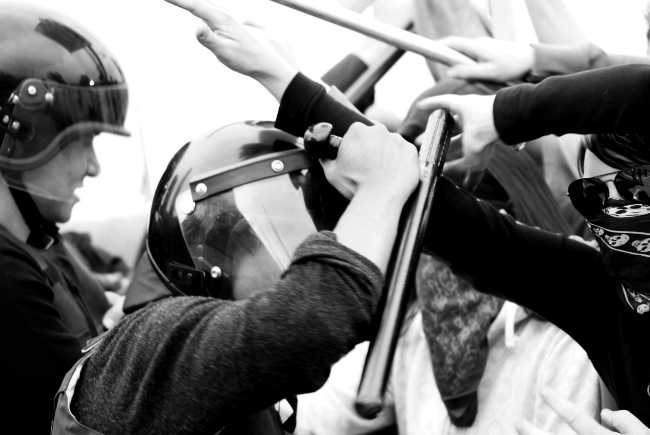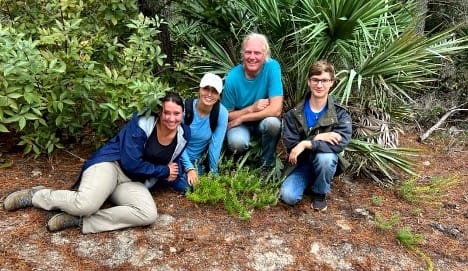In this post, we welcome guest writer, Noah Guthrie. Born in Scotland, raised in Nashville, Noah serves as an intern with A Rocha USA, a Christian non-profit dedicated to living out God’s call to care for creation. His work will span from Titusville, FL, to Austin, TX, between now and May 2024.
One of the most un-Noah-ish things I’ve ever done for the sake of creation was invading – along with a number of young activists – an opulent business conference. Marching through the doors, we confronted an auditorium of industry leaders with markered signs, protesting the poor environmental conditions that had killed two blue-collar workers. Before that morning, I hadn’t known that we were actually going to burst into the conference room, and I couldn’t decide whether this was an instance of appropriate outrage (two people had died, after all), or one of needless drama, more likely to inspire resentment than resolution.
Luckily, we got out of there before security arrived, but I was mortified. More than ever, I felt how deeply my attempts to serve God through social action put me at odds with my own temperament. I was (and am) shy, soft-spoken, and conflict-avoidant, with little desire to offend anyone, even if they’re hurting God’s world.


First Picture: The Brooksdale Environmental Centre, Surrey, British Columbia; Second Picture: The Brooksdale Wetland, with the Interns’ House (Hazelmere) in the Background
I became involved with social activism in a kind of backwards manner. Surprisingly, it began at the Brooksdale Environmental Centre, a combination research, education, and organic farming site in the Pacific Northwest, where I worked as a conservation science intern for A Rocha Canada.
A Rocha (whose name means “The Rock” in Portuguese) is one of the only global Christian creation care nonprofits that I know of. Working in over 20 countries, and with projects ranging from scientific research to habitat restoration, environmental education, and church engagement, this faith-based network is united under the following mission statement: “To live out God’s calling to care for creation and equip others to do likewise.”
So, when I started working at Brooksdale in 2018, I definitely expected to do things like plant trees, explore wetlands, and discuss environmental theology. What I didn’t expect was to be pushed towards political advocacy.

One of the center’s visitors, a grey-ponytailed Quaker named Fred, gave me and the other interns a presentation on the Canadian tundra. He described the wonders of musk-oxen, rabbits, owls, and tundra polygons, and then – against his original intention of giving a hopeful talk – lamented the irreparable damage climate change would wreak in these cold-adapted ecosystems. Towards the end of his talk, Fred stated that one of the biggest issues was that young people just didn’t care about the planet, and that they wouldn’t even vote for the sake of protecting it.
This comment struck a chord in me. Up to that point, I’d managed to steer clear of any serious political involvement, with all its controversies, and I was pretty proud of it. In light of that, it horrified me to have my avoidance characterized as not caring enough about God’s creation.
Of course, there are many ways to care for the planet, so it’s not the case that everyone who doesn’t vote doesn’t care. No one should be shamed for that. Still, I realized that voting provided a simple and easy way to advocate for creation, and if I really wanted my faith to inform every area of my life, it made sense that it would flow into social action.

I asked one of the other interns for help in registering to vote, and that fall I mailed out my first absentee ballot. For any readers interested in registering or checking their registration, websites like “Vote.org” can be very helpful.
In subsequent years, I found more ways of advocating for creation through social action. I learned how to draft op-eds, send emails and make phone calls to my representatives, and write public comments about things like clean energy and electricity production.
For those interested in learning how to develop positive relationships with representatives, engaging with them through emails, op-eds, or in-person meetings, I’d recommend connecting with the Citizens’ Climate Lobby. The Sierra Club provides a number of advocacy opportunities through a national network of chapters, while the Evangelical Environmental Network provides an array of resources and action-points through a faith-based lens.

Other good organizations include the Environmental Voter Project and the Sunrise Movement, and you can find more groups to support, whether by donating or volunteering, on this blog post by Donorbox.
There are a variety of attitudes among environmental activists, but I’ve often been struck by the antagonism many of them direct towards public leaders. One of the more dramatic examples of this is the protest I described at the start of this post. Despite the fact that the conference we burst into was explicitly focused on sustainability, the protest leaders kept telling us that the event was just greenwashing and hypocrisy.
This could have been true, of course, but there also could have been many people at that conference with the same concerns that we had. I was disturbed by the protesters’ bias to assume the worst of any leader they considered anti-environmental.

Part of the issue with such quick assumptions is that it dehumanizes the public leaders involved. If we want to make real change in defense of God’s creation, then the end-goal of most political confrontations, whether protests, lobby meetings, or whatever else, should be collaboration or compromise, which requires us to engage our leaders with respect. Cursing at our representatives (something that I have, unfortunately, witnessed in person) isn’t going to inspire constructive action.
Injustice sometimes requires a dramatic response, as Jesus did when he chased money-changers out of the Temple with a whip (John 2:15), but I see a deep need in environmental circles for Christ-like compassion. We need protesters like Shadrach, Meschach, and Abednego, who were respectful yet firm in their civil disobedience (Daniel 3:16-8), and leaders like Jesus, who didn’t allow his determination to reconcile all things to himself (Colossians 1:19-20) to undermine his conviction to love his enemies (Matthew 5:44).

One example of a Christ-like activist is Katharine Hayhoe, an acclaimed atmospheric scientist who dedicates immense effort to nurturing constructive dialogue on climate change. In one of her books, Saving Us: A Climate Scientist’s Case for Hope and Healing in a Divided World, Hayhoe discusses how seeking common ground in conversation with others can inspire powerful action in defense of God’s creation.
Science writer John Schwartz, applauding Hayhoe in The New York Times, declares, “In a nation seemingly addicted to argument as a blood sport, she conciliates… On a topic so contentious that most participants snarl, she smiles. She is an evangelical Christian, and she does not flinch from using the language of faith and stewardship to discuss the fate of the planet.”
It’s helpful for me to remember that love is the source of all good activism. In recent months, five years after my internship with the Brooksdale Environmental Centre, I’ve received a new opportunity to cultivate my love for creation through an internship with A Rocha USA.

During our work in Florida, the other interns and I would often kayak through the Indian River Lagoon to collect data on light penetration. As we paddled through the water, anhingas would spread their wings on the rocks, the gemlike blossoms of comb jellies would drift past, or a butterfly ray would wing across the sandy floor.
Some days, the beach would come alive with hundreds of horseshoe crabs, their domed helmets swarming like an army of polished river-stones. If I was lucky, I’d see the fin of a dolphin rise and fall in the distance, a crest of mute sanctity.

These are my family. These are my fellow creatures, who God blessed to “be fruitful and multiply” (Genesis 1:22), and who I want to protect with whatever tools I might have, even if that means engaging in social activism. I’m willing to enter a world where I’m ill-fitted if it means protecting the world that I call home.
What has advocating for creation looked like in your life? I’d love to hear more about your experiences or about any thoughts you may have on this post. Feel free to get in touch with me at “noah.guthrie@gmail.com”!

Noah Guthrie